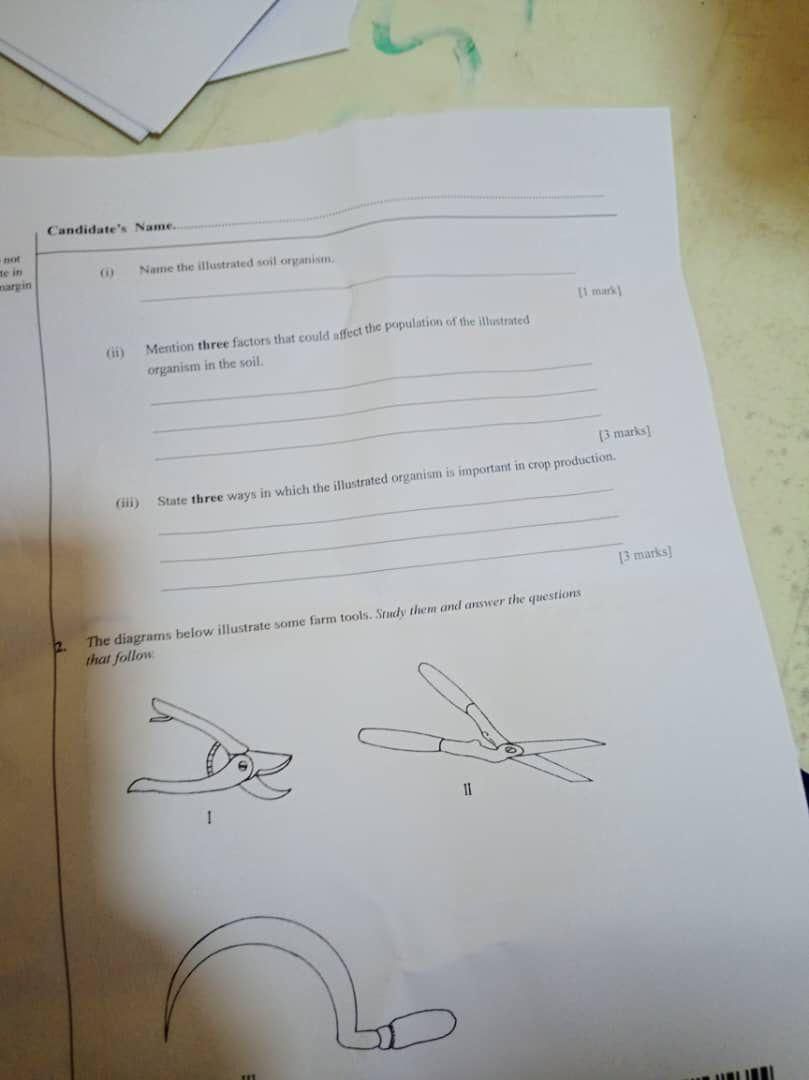If you are preparing for the 2025 WAEC GCE Agricultural Science Practical (Alternative to Practical), this article provides all you need. It contains Waec GCE Agric science Practical exam details, preparation tips, and updates on questions and answers for the November/December (2nd Series) exams.
We also provide guidance to help you understand the WAEC GCE Agric (Alt. to Practical) exam format and key focus areas. Whether you’re looking for the 2025 WAEC GCE Agricultural Science Practical questions and answers expo or simply want reliable past-question insights, this page will guide you.
Download WAEC GCE Agricultural Science Practical (Alternative to Practical) 2025 Answers
You can also download the Agricultural Science Practical answers for 2025 as PDF for offline study. These resources will guide your preparation and improve your confidence for the 2025 exams.
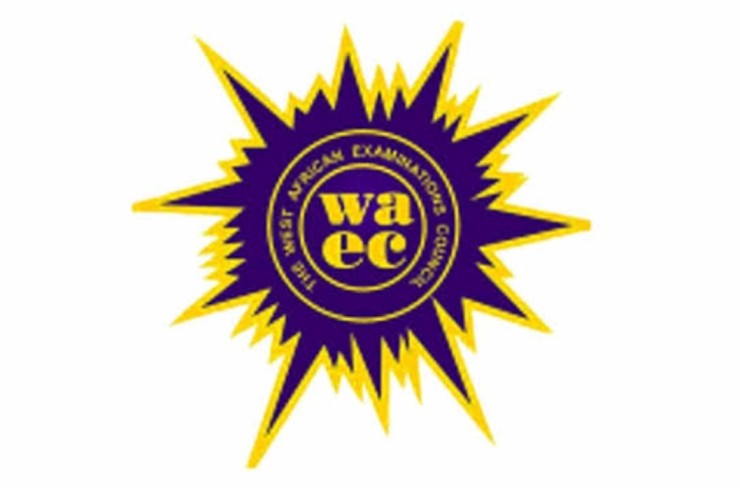
Important Date:
The Agricultural Science 3 (Alternative to Practical) exam is scheduled for: Wednesday, 10th December 2025 Time: 13:00 hrs – 14:30 hrs (1 hr 30 mins).The timing will be officially confirmed by the West African Examinations Council (WAEC).
🌱 Join Our WAEC Exam Room
Get live updates, verified answers, and connect with other students preparing for WAEC Agricultural Science GCE and other subjects.
NOV/DEC 2025 WAEC GCE Agricultural Science Practical (Alternative to Practical) Questions and Answers
The resources provided below will help you prepare effectively for the Agricultural Science Practical exams. These study materials are tailored to guide candidates towards success in the WAEC GCE 2025.
- Understand how questions are set for Agricultural Science Practical.
- Learn strategies for answering questions clearly and concisely.
- Boost your confidence with practical study tips.
WAEC GCE Agricultural Science Practical (Alternative to Practical) Answers | Dec 2025
=====================================
=====================================
[ANSWERS LOADING =========================]
DISCLAIMER: This article is provided for educational purposes only. We do not encourage or support exam malpractice in any form.
To access free Questions and answers, simply subscribe to our YouTube channel by clicking the “Subscribe Now” button ✅ below 👇👇👇.
Watch the video below 👇
WAEC GCE Agric Practical Past Questions and Answers
=======================
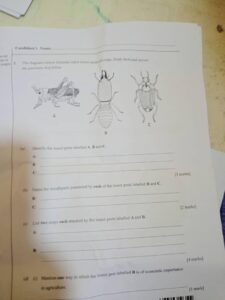
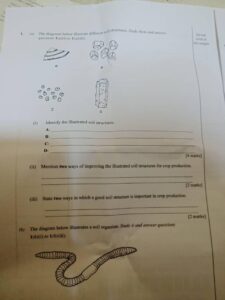
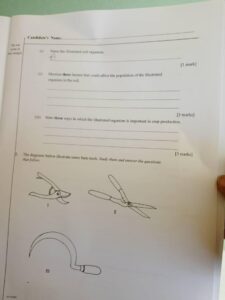
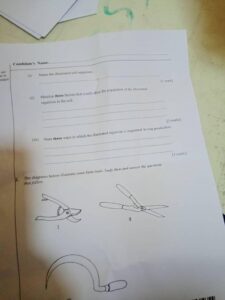
=======================
AGRICULTURAL SCIENCE-PRACTICAL ANSWERS
(1ai)
A – Platy
B – Blocky
C – Granular
D – Prismatic
(1aii)
(PICK ANY TWO)
(i) Add organic matter (eg, compost or manure) to enhance soil aggregation and fertility.
(ii) Practice conservation tillage to avoid soil compaction and maintain structure.
(iii) Introduce cover crops to reduce erosion and improve soil health.
(iv) Apply gypsum to improve the structure of clay soils by breaking down compacted layers.
(1aiii)
(PICK ANY TWO)
(i) Enhances water infiltration and retention, ensuring sufficient water for plant roots.
(ii) Improves aeration, enabling root respiration and nutrient uptake.
(iii) Reduces soil erosion by holding soil particles together.
(iv) Facilitates root penetration, allowing plants to access deeper nutrients and water.
(1b)
Earthworm
(1bi)
(PICK ANY THREE)
(i) Soil pH (earthworms thrive in neutral to slightly alkaline soils).
(ii) Moisture levels (they require moist soil for survival).
(iii) Organic matter availability (as food source).
(iv) Soil temperature (extreme heat or cold can reduce their population).
(v) Use of chemical fertilizers or pesticides (can harm or kill earthworms).
(1biii)
(PICK ANY THREE)
(i) Enhances soil aeration through burrowing.
(ii) Increases soil fertility by breaking down organic matter into humus.
(iii) Improves water infiltration by creating tunnels in the soil.
(iv) Promotes nutrient cycling by digesting and excreting organic materials.
(v) Reduces soil compaction, creating better conditions for root growth.
=========================
(3a)
Spec A; grasshopper
Spec B: termite
Spec C: weevil
(3b)
Spec; B Termites typically have chewing mouthparts, adapted for consuming wood and plant material.
Spec; C Weevils have chewing mouthparts, which they use to bore into grains and seeds.
(3c)
Spec; A
(i)maize
(ii)wheat.
Spec; B
(i)sugarcane
(ii)maize.
(3di)
Termites can cause extensive damage to crops and wooden structures. This can lead to increased costs for farmers due to crop loss and the need for pest management and control measures.
(3dii)
Treat wood with termiticides or use termite-resistant materials like steel, concrete, or plastic for building poultry pens.
(3e)
(i)Proper Cleaning and Sanitation
(ii)Airtight Storage
(iii)Insecticides
(iv)Fumigation
=========================
(4a)
A: Natural brooding (using a hen to provide warmth to chicks).
B: Artificial brooding (using artificial heat and light source for chicks).
(4b)
I: Heat/Light source (electric bulb).
II: Reflector.
III: Feeding and water trough (or feeding area).
(4c)
(i) Regular cleaning and disinfection of the brooder.
(ii) Ensuring constant supply of clean water and feed.
(iii) Monitoring and maintaining the appropriate temperature.
(iv) Checking and replacing the bedding material.
(4d)
(i) Rats.
(ii) Snakes.
(iii) Mice.
(4e)
(i) Limited number of chicks can be brooded at once.
(ii) Higher risk of disease transmission from the hen to the chicks.
(iii) Inconsistent heat supply, especially during cold weather.
*WAEC GCE AGRIC PRACTICAL*
(4a)
A: Natural brooding
B: Artificial brooding
(4b)
I: Electric bulb
II: Reflector
III: birds
(4c)
(PICK ANY FOUR)
(i) Cleaning the brooder box regularly
(ii) Changing and providing fresh feed
(iii) Supplying clean water daily
(iv) Monitoring temperature and adjusting the bulb
(v) Disinfecting the brooder box to prevent disease.
(vi) Ensuring proper ventilation in the housing unit.
(vii) Checking for and repairing damages to the housing unit.
(viii) Providing adequate bedding material (e.g., sawdust).
(ix) Regularly observing chicks for signs of illness or stress.
(x) Replacing the bedding when it becomes damp or dirty.
(4d)
(PICK ANY THREE)
(i) Rats
(ii) Snakes
(iii) Lizards
(vi) Birds
(4e)
(PICK ANY THREE)
(i) High mortality rate due to predation
(ii) Limited number of chicks hatched at a time
(iii) Dependence on the hen’s health and availability
(iv) Inconsistent temperature control, which can affect chick survival.
(v) Slower growth rate of chicks due to limited care and resources from the hen
Recommended Posts:
- 2025 WAEC GCE Auto Mechanics OBJ/Essay Answers
- 2025 WAEC GCE Igbo, Hausa, and Yoruba OBJ/Essay Answers
- 2025 WAEC GCE Basic Electronics Answers
DISCLAIMER: This service is provided for educational purposes only. We do not promote or encourage exam malpractice. Stay focused, and ace your WAEC GCE AGRIC Questions and Answers 2025 exam!
